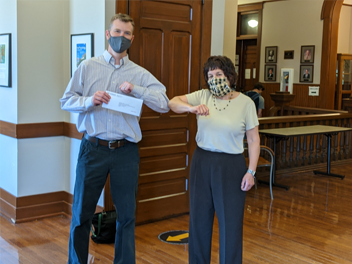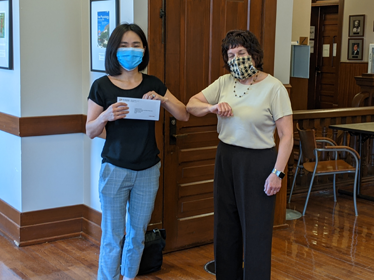Hoverman and Zhou Earn Promotions
Purdue Forestry and Natural Resources congratulate Dr. Jason Hoverman and Dr. Mo Zhou for their promotions to full professor of vertebrate ecology and associate professor of forest economics and management with tenure respectively.
College of Agriculture Dean Karen Plaut stopped by Leopold’s Landing in Pfendler Hall on Friday to make it official by presenting Hoverman and Zhou their promotion letters.
Hoverman joined the FNR faculty in 2012 as an assistant professor of wildlife ecology. He was promoted to associate professor in 2017. Throughout his tenure at Purdue, he has taught several courses: Ecosystem Management Practice (FNR 408), Advanced Herpetology (FNR 598), Wildlife in America (FNR 240), Disease Ecology (FNR 529), the Wild Things Learning Community (FNR 198) and Amphibian Ecology and Conservation (FNR 598).
Hoverman has garnered several honors in his time at Purdue, beginning with the George Mercer Award from the Ecological Society of America in 2013. The Mercer Award is given for an outstanding ecological research paper published by a younger researcher (age 40 or younger at the time of publication). Hoverman then received a Bravo Award from Purdue for creativity and innovation in 2014 and was honored with the Seed for Success Award in 2017 for securing an external sponsored award in excess of $1 million. Most recently, he was recognized as a University Faculty Scholar in 2019, an award which recognizes outstanding faculty members across the university who are on an accelerated path for academic distinction.
Hoverman earned his bachelor’s degree in ecology and evolution from the University of Pittsburgh in 2000 and completed his PhD there in 2007. He went on to post-doctoral research associate positions with the Center for Wildlife Health in the Department of Forestry, Wildlife and Fisheries at the University of Tennessee (2007-10) and the Department of Ecology and Evolutionary Biology at the University of Colorado (2010-12) before coming to West Lafayette.
“FNR is very proud of Dr. Jason Hoverman’s promotion to full professor,” FNR department head Dr. Bob Wagner said. “Jason is an international expert on the effects of environmental factors on amphibians. He is extremely well known for his cutting-edge work on the effects of pathogens and pesticides on amphibians. Dr. Hoverman has published 84 articles in top- tier journals and secured >$6.5 million in research grants from federal and state agencies. In addition, he received the Mercer Award of the Ecological Society of America and is a Purdue University Faculty Scholar. Congratulations Jason.”
Currently, Hoverman is working on multiple research projects examining the effects of Per-/Polyfluoroalkyl Substances (PFAS), of “forever chemicals,” on wetland species and ecosystems. These collaborative projects are funded by multiple agencies including the Department of Defense Strategic Environmental Research and Development Program, the Michigan Department of Natural Resources, the Indiana Water Resources Research Center, and the Purdue Center for the Environment. Hoverman’s work will advance our understanding of the adverse effects and risk posed by “forever chemicals” and be used in management and conservation initiatives across the globe.
Zhou came to Purdue in 2018 as an assistant professor of forest economics and management, after serving in assistant professor positions at the University of Alaska (assistant professor of economics 2008-11) and West Virginia University (assistant professor of forest economics, 2011-18).
She is currently the lead economist and a steering committee member of the Global Forest Biodiversity Initiative (GFBI) and an associate editor of the Canadian Journal of Forest Research. She also is the co-director of the Forest Advanced Computing and Artificial Intelligence Lab (FACAI), which employs the paradigm of artificial intelligence encompassing different state-of-the-art machine learning and statistical methods to study global, regional, and local forest resource management and biodiversity conservation.
Zhou earned her bachelor’s in information sciences in forestry from Beijing Forestry University (BJFU) in China in 1998, her master’s in forestry from Technical University of Munich (TUM) in Germany in 2001 and her PhD in forest economics and management from the University of Wisconsin in 2005.
She earned a certificate of appreciation from the University of Alaska Fairbanks in 2009 and received an International Scholar Recognition Award from WVU in 2013.
Zhou’s research focuses on integrating economic theory and data science to value nonmarket goods in forests and derive landowners’ preferences and their interactions; optimal decision-making in forest management under risk and uncertainty induced by climate change; economics of forest biodiversity at large scale; and dynamics of timber market and trade of forest products.
Zhou’s work on a publication titled “Climatic controls of decomposition drive the global biogeography of forest-tree symbioses” was featured on the cover of Nature on May 19, 2019. Her most recent paper “Input Substitution and relative input price variability in timber markets” was published in the Canadian Journal of Forest Research in December 2020. In 2020, she also coauthored “A welfare analysis of China’s tariffs on U.S. hardwood products” with Xufang Zhang and Dr. Eva Haviarova in Forest Policy and Economics and “Consequences of Discount Rate Selection for Financial and Ecological Expectation and Risk in Forest Management” in the Journal of Forest Economics.
“We all congratulate Dr. Mo Zhou in her promotion to associate professor with tenure,” Wagner said. “As a forest economist, Dr. Zhou’s research focuses on the movement of price signals of timber and other forest products, through various stages of production, among tree species, across geographically segregated markets, and under different policy regimes. She also has provided forest landowners with a wide variety of tools to help them better manage their forests. As a scholar, Dr. Zhou has published 32 articles in top tier journals, including the elite journals Nature and Science. Since joining Purdue, Dr. Zhou also has authored several extramural grants totaling nearly $2 million. Mo also has proven herself to be an enthusiastic and effective teacher to FNR students.”








